A guy said this to me (if not in this precise sequence) the other day. He knows this town and how it’s been evolving, etc. And in a moment of despair…
“It was going to be Deliverance in the Gobi desert. The script was about character with everyone slowly going insane as the days went on, and when the new plane was built the pilot is reluctant to fly it because the desert crash was his fault and his confidence is shot.
“And he couldn’t be Mel Gibson. If it was Gibson you’d want to see him do it. You’d be waiting for that.
“Then the studio said they wanted the Bedouins to come back and attack the plane at the last minute, just as they were trying to lift off. But hold on. If the baddy Bedouins are close enough to regroup and gather their forces they must be within shouting distance of some kind of half-civilized outpost, so why don’t the survivors just walk to wherever that is? That didn’t get through. The studio didn’t care about that.
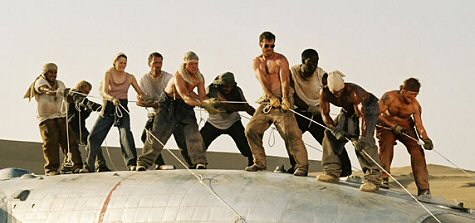
“It was the first movie I ever worked on in which notes on the script were sent along by the head of marketing. Mainly because suddenly the movie was costing $60 million dollars. The average movie costs $65 million, and then it’s $35 million to open it.
“This business has become so wag-the-dog, so marketing driven. And with $60 million being spent no one can look like they’re really hurt or dying, no one can lose their minds, there can’t be any swearing, and no heavy character stuff.
“There was another stranded-in-the-desert thing called The King is Alive. It was a Dogma movie, didn’t cost anything, same basic deal, people stranded in the wilderness. But on a stripped-down budgetary level, Hollywood doesn√ɬØ√Ǭø√ǬΩt know how to make a film like that. They don’t want to know, I mean.
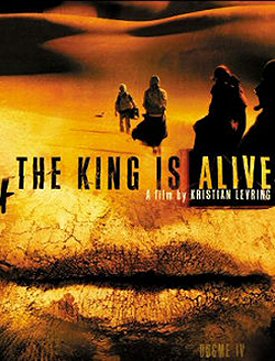
“I’ve actually heard studio guys refer to drama as “the ‘d’ word.
“The phrase you always hear when it comes down to the crunch about whether to greenlight a movie is ‘let’s run the numbers.’ The new kind of studio heads like Jeff Robinov who are ex-studio agents, they all have the same matrix in their heads. They run their p and l’s, profit and loss projections, expectations of earnings in this market, that territory. And I’m telling you this mentality of running the numbers is killing the business.
“Bill Mechanic was the original guy on it, and Michael Mann and Eric Roth worked on it. But then Mann and Mechanic couldn’t come to terms on the deal. But it kept on. Five or six guys wound up writing it in stages.
“Remember when Jeffrey Katzenbeg was running Disney? All the movies started to feel the same? That’s what happening to the movie business as a whole now. They all have to meet the same requirements, and the audience is so chicken these days. Nobody wants to see what’s on the other side, and nobody wants exotic…not really. Everybody wants to see more-or-less familiar. And the adult film is being killed. Studios used to make genre films for adults, and that’s over now.
“We’re getting what we’ve asked for. We really are.
“If I were starting my career now, I would want to be David Chase. That’s who I’d want to be. Doing a show like The Sopranos is the only way to explore character and theme these days and make something that feels like art.

“The old-time executives would bet on a few really good films. Today’s executives have been programmed to skip the heartbeat part. Formula is all. Studio-level jobs are the worst jobs in the world. The way it’s decided, when things are sussed out, they’re all in the room together including the marketing guy, and he always has a very strong voice.
“It’s a free-market economy, and what’s being made is determined by what people want to see. There was this marketing guy who said to me once, “We’re trying to get a younger audience, so we’re retooling the campaign to get the 60 year-olds in.”
“If they were making Dog Day Afternoon today Sonny wouldn’t be robbing a bank to get money for a sex change operation for his lover. He’d need the money now to try and keep his son from dying of cancer.”
Baby Killers
The other shoe on Million Dollar Baby clomped down on the pavement a week or so ago. I’m referring to slams by three fairly heavy cats — Slate‘s David Edelstein, Salon‘s Charles Taylor and New York Press critic Armond White.
These guys are far from nutso. They’re sharp and witty samurais who are fully in touch with their aesthetic standards and can expertly slice and dice when they’ve a mind to.
It’s not that I disagree strongly with Taylor and Edelstein√ɬØ√Ǭø√ǬΩs complaints, which boil down to things in this Clint Eastwood film that they find hokey, hard to swallow, manipulative or old-fashioned. White says the movie proves that Eastwood “thinks in simplistic terms that actually deny modern political complications.” He also describes Baby (or is he talking about the third-act turn?) as “the ghost of bogus Hollywood uplift.”
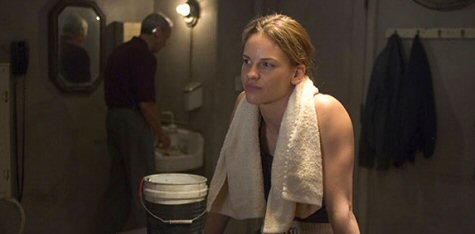
What these guys are saying is like spitting in the wind. They can take shots with their Anthony Mann Winchester repeat-action rifles and it doesn’t matter. If a movie works, you can feel it and there’s no disputing this. Million Dollar Baby may be this, that or the other thing, but it’s basically about a riveting third act that’s been extremely well set up.
As Taylor wrote, “You’re not prepared — even with the air of fatalism — for the jump from one shameless genre to another. It’s impressive, in the sense that a sucker-punch impresses itself on your skull.”
White says it’s all so hoary and predictable that when Eastwood eventually swings his left hook, gullible viewers are caught unawares. They respond inordinately, as if they’d just seen a ghost.”
With Regrets
“There is already buzz about Jane Fonda’s comeback in New Line’s comedy, Monster-In-Law,” Emanuel Levy wrote the other day.
“The most brilliant American actress of the 1970s has not acted since the disastrous Stanley and Iris in 1990,” he continued. “Fonda proves that, contrary to what Henry James said, there are second (and third and fourth) acts in American lives. Fonda is now beginning her next phase.”
I haven’t heard any buzz at all about Monster-in-Law but c’mon…it’s got Jennifer Lopez in the lead, which means there’s a built-in curse because the Gods are four-square against her these days, and there’s no defeating the Gods when they’re in this kind of mood.
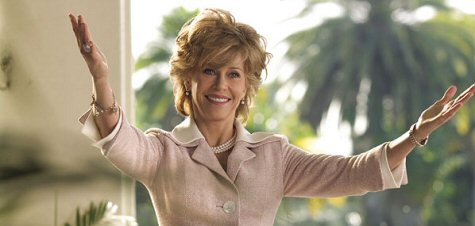
Let me tell you about Jane Fonda’s 21st Century comeback, which is actually a case of a thrown-away opportunity along with a disappointing turndown, followed by a fallback decision to star in a who-knows? New Line comedy.
Last year Cameron Crowe offered Fonda an exquisitely written small part in his recently-wrapped Elizabethtown (Paramount, 7.29.05). It was the role of Hollie Baylor, the mother of Drew Baylor, the romantic lead played by Orlando Bloom.
Once Fonda let it be known a year and a half ago (or was it in early ’02?) that she was interested in getting back into acting, Crowe did everything he could to seduce her into playing the part. I’m told he went so far as to drive out to her ranch in New Mexico to personally deliver the script.
But Fonda felt there wasn’t enough to Holly. She had a point at the time. Early drafts made spare use of Holly in the first and second acts — her only big moment was a speech-before-the-family scene in the third act. Crowe understood what Fonda wanted but asked her to take the journey with him on faith, pledging that together they would fix the problems. Fonda hemmed and hawed but finally said no, and Susan Sarandon wound up taking the part.
If you’re a 60ish woman trying for a comeback, you can’t do better than play a plucky mom in a Cameron Crowe film. Opportunities simply don’t get any better than this, but Jane couldn’t show trust and shot herself in the foot. That’s a fact.

Then she tried to land the alcoholic mother role in Jim Brooks’ Spanglish, but Brooks wasn’t quite sure and asked her to read for the part, which Fonda did. Brooks turned her down, giving the role to Anne Bancroft instead. Then Bancroft had to drop out for health reasons and Cloris Leachman stepped in.
So Fonda took the part of Lopez’s nuptial adversary in Monster-in-Law. It might be a great little comedy and Fonda may be perfect in it, but the premise is basically Meet the Parents with Fonda in the Robert De Niro part. The director is Robert Luketic (Win a Date with Tad Hamilton!, Legally Blonde). Really…all kidding aside…how good does anyone honestly expect this film to be?
Blues Project
I’m okay. It√ɬØ√Ǭø√ǬΩll all be over soon. Just one more week, and then New Year’s Eve and the final weekend, and then the system will start up again.
Christmas is great as an approaching emotional feeling, but when it finally gets here all you want is for it to be over. It�s good for reading books, though. Good for doing quiet-type things. Good for not hearing from anyone. Good for feeling the world has stopped. Good for bike riding, long walks, watching documentaries. Good for testing your mettle by not eating. For me, Christmas is apples and grapes and canned pineapples.
I spent a good part of Thursday editing and composing other columns (two), typing out invoices and insert orders, dealing with technical matters and wondering if it matters if I write a 12.24 column or not. I wish I had the character to blow it off during the down times.
I also watched Paul McGuigan’s Wicker Park on DVD. Not bad. At least it wasn√ɬØ√Ǭø√ǬΩt a thriller. It doesn’t quite deliver as a relationship drama, and there’s no way it’s “a dangerously sexy thriller,” which is a quote from In Touch weekly on the front of the DVD cover.
But I wasn√ɬØ√Ǭø√ǬΩt in agonizing pain watching it, and the leads — Josh Hartnett, Rose Byrne, Diane Kruger, Matthew Lillard — hold up their end fairly well.
Ship vs. Planes
There’s a scene in Titanic when Leonardo DiCaprio’s Jack Dawson — an independent-minded, self-starting, vaguely bumpkinish guy who lives by his own rules — sits down with a bunch of white-tie swells in the first-class dining room. Jack’s a little intimidated at first, but he stands his ground by being himself and explaining a personal philosophy that’s hard to disagree with, which is to always “make it count.”
It’s not a great scene, but it’s a moderately satisfying one. It instills respect for Jack, and at the same time lends a certain warmth by saying that even the blue-bloods can relax and laugh at themselves and show respect for a guy who can look them in the eye.

There’s a scene in The Aviator when DiCaprio’s Howard Hughes — vaguely bumpkinish, independent-minded, self-starting, living by his own rules — sits down with a bunch of Connecticut swells, or rather the family of his girlfriend, actress Katharine Hepburn.
Howard’s a little intimidated at first, but the Hepburns are absurdly rude and snooty to him, which eventually leads to his getting testy and a little bit rude himself.
“We don√ɬØ√Ǭø√ǬΩt care about money here, Mr. Hughes,” says Mrs. Hepburn.
“That’s because you have it,” Howard answers.
“Would you repeat that?”
“You don’t care about money because you have it,” he says again. “And you’ve always had it. My father was dirt poor when I was born…”
“Back in torrid Houston, this would be?” asks Mrs. Hepburn.
“Oh, shut up,” snaps Howard.
“Howard!” Kate exclaims.
“I care about money, Mrs. Hepburn, because I know what it takes out of a man to make it,” Howard continues. “Now if you’ll excuse me I have some aviation nonsense to take care of.”
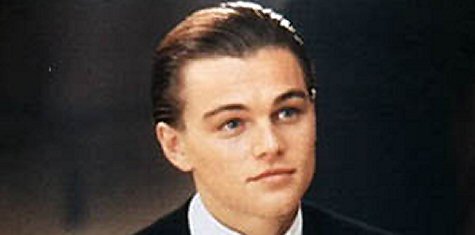
And then he gets up and bolts out of the room like a six year-old. Kate joins him later on for a croquet game on the back lawn. “I think father rather likes you,” she tells him. “But really, though…you can√ɬØ√Ǭø√ǬΩt retire from the field of battle like that or they’ll never respect you.”
Exactly. Nobody likes a quitter. I suppose this scene (written by John Logan) was meant to act as a counter-weight to the scene at the end when Hughes boldly jousts with Senator Owen Brewster (Alan Alda) in front of a battery of cameras and microphones. But I don’t get why a guy with the balls to slap down an aggressive politician can√ɬØ√Ǭø√ǬΩt handle himself better with the Hepburns. It doesn’t add up.
A lot of serious-minded critics are saying The Aviator is a near-great film that should win director Martin Scorsese his long-overdue Oscar. They’re dreaming. The dinner-with-the-Hepburns scene is one reason it doesn’t make it. The stylish thing over the last five or six years among critics has been to loathe Titanic, but it’s a far more satisfying thing to watch than The Aviator.
Voice Critics Poll
“Something about that poll seems to bring out the cunty side of too many critics. The snarky comments turn me off; they often dehumanize actors, filmmakers and devalue the sincerity of movies the critics don’t happen to respond to.
“Some of the participants behave like the smart-ass outsider kids in high school who were shut out of the school’s power elite, and avenged themselves by congregating at a particular cafeteria table and making shitty remarks about everyone else in the room, or by going to a school dance and not dancing, but standing off to the side and making fun of everybody else’s dancing.
“That kind of behavior makes the participants feel more powerful, but the power is illusory, and it inadvertently validates other peoples’ negative opinions of them. The Voice poll is a good idea in theory, but in practice I think it gives the general public one more reason to think of critics as smug, elitist bastards.” — Respected New York film critic
How Bad is This?
“As a holiday treat, I took my staff to see a matinee showing of Meet The Fockers. No wonder why Dustin Hoffman referred to it as ‘this thing.’
“There were definitely a few amusing scenes in it — I laughed mildly at those. But it was such a blown opportunity — most of the jokes fell flat and it was full of the most awful ethnic stereotyping I’ve seen in a movie in years. While the Byrnes (DeNiro and Danner) are still the uptight, conservative couple, the portrayal of their opposites was positively offensive.

“This movie probably set back blue-state causes 100 years. The Fockers are portrayed in the film as the most obnoxious, overbearing, nosy and loud Jewish couple on the Eastern seaboard. Their sentences are filled with Yiddish and Hebrew words, and stereotyped ethnic intonation (especially Streisand), that you really had to wonder what country this couple was born in.
“Hoffman is supposed to be a former 60’s radical from Detroit, but every other word out of his mouth was Yiddish or Hebrew — what baby boomer in their 60’s talks like this? Streisand was saying ‘buballeh’ all the time — you’ve got to be kidding!!
“Clearly the movie was meant to have this ‘blue state’ versus ‘red state’ understory, and you could see there was real potential to explore that — but it barely got out of the gate. Teri Polo looks awful compared to the original film — her makeup looks bad and she looks like she’s aged more than a few years. Stiller and DeNiro sleepwalk. I was most excited to see Hoffman, and it was great to see him in a broad comedy — but NOT THIS ONE, in retrospect.
“Frankly, I don’t understand how Hoffman and Streisand, who are both Jewish, would have bought into this ludicrous script and portrayal of their own people. I guess I can play Devil’s Advocate and say ‘This is a comedy and these guys are supposed to be stereotypes.’ But it’s just so extreme in their case that I’m just waiting for the B’nai Brith to go on the warpath.
“Spare yourself.√ɬØ√Ǭø√Ç¬Ω — Drew Kerr
Wes
“Regarding Christopher Lee’s thoughts on The Life Aquatic and Bill Murray’s comment that he had to see his own movie three times before he ‘got it’, that’s been the same experience I’ve had on all of Wes Anderson’s movies.
“The first time I watched Bottle Rocket, Rushmore and The Royal Tenenbaums, my reaction was, ‘This is it? this is what the fuss is all about?’ And then you watch the movies again and again, and they grow on you.
“Tenenbaums is now one of my favorite movies and I have endless admiration for Wes Anderson, a director talented enough to actually pull meaningful performances out of two of the 21st century’s most irritating and overrated actors, Ben Stiller and Gwyneth Paltrow.” — Michael Zeigler.
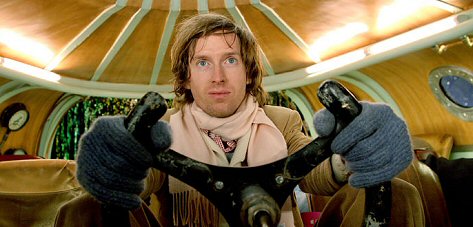
“There’s a reason people have to watch Wes Anderson’s movies multiple times (except Bottle Rocket). With every new feature there is less and less narrative flow, less and less development — merely a collection of fully formed, isolated characters that barely interact with one another.
“Once the disconnected vignettes or emotional set-pieces (like car chases in an action film) are seen once and it is clear that they do not form a cohesive whole (except in terms of tone), then upon second and third viewing the audience doesn’t have to worry about ‘where is this film going?’ or ‘what does this all mean?’
“The repeated viewings are therefore like putting on a comfortable pair of shoes, and thus easier on the viewer and so the films sink in, regardless of the fact they seem to be merely tasteful collections of music videos. I don’t think this is a good thing at all, and I am a big Wes Anderson fan. He takes the easy way out and his films have less and less meaning.” — Craig Kaplan
Kissing Santa
“This time of year in Aspen is amazing. It’s Golddigger week (the last week) and you pretty much get every golddigger and high-end hooker in the country flocking to Aspen like swallows to Capistrano.
“I’ve met some of the contenders and there’s a real hierarchy. The best ones are bright, interesting, charming and very presentable. And very attractive. And worth it.
“The next level down is the aspiring actress type. Donald Trump goes for these women — the top level is out of his league.

“The next level down is a real Town and Country look and an attitude that suggests sophistication and breeding, but if you’ve ever known anyone with real sophistication and breeding you know they make an effort to act normal, not snotty. They’re kinda fascinating and sad. And usually from white trash stock. (They measure everything by dollar value). And when they get too old and haven’t found their scholarship, they can get pretty desperate.
“Next level down from the snotties are the expensive call girls with a slightly sleazy look, all in search of a meal ticket.” — Industry Guy Partying in the Rockies
Wells to L.A. Guy: I take it you’ve had an unsatisfying encounter with a Town and Country girl?












